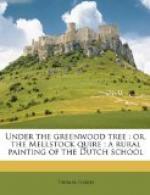Geoffrey Day lived in the depths of Yalbury Wood, which formed portion of one of the outlying estates of the Earl of Wessex, to whom Day was head game-keeper, timber-steward, and general overlooker for this district. The wood was intersected by the highway from Casterbridge to London at a place not far from the house, and some trees had of late years been felled between its windows and the ascent of Yalbury Hill, to give the solitary cottager a glimpse of the passers-by.
It was a satisfaction to walk into the keeper’s house, even as a stranger, on a fine spring morning like the present. A curl of wood-smoke came from the chimney, and drooped over the roof like a blue feather in a lady’s hat; and the sun shone obliquely upon the patch of grass in front, which reflected its brightness through the open doorway and up the staircase opposite, lighting up each riser with a shiny green radiance, and leaving the top of each step in shade.
The window-sill of the front room was between four and five feet from the floor, dropping inwardly to a broad low bench, over which, as well as over the whole surface of the wall beneath, there always hung a deep shade, which was considered objectionable on every ground save one, namely, that the perpetual sprinkling of seeds and water by the caged canary above was not noticed as an eyesore by visitors. The window was set with thickly-leaded diamond glazing, formed, especially in the lower panes, of knotty glass of various shades of green. Nothing was better known to Fancy than the extravagant manner in which these circular knots or eyes distorted everything seen through them from the outside—lifting hats from heads, shoulders from bodies; scattering the spokes of cart-wheels, and bending the straight fir-trunks into semicircles. The ceiling was carried by a beam traversing its midst, from the side of which projected a large nail, used solely and constantly as a peg for Geoffrey’s hat; the nail was arched by a rainbow-shaped stain, imprinted by the brim of the said hat when it was hung there dripping wet.
The most striking point about the room was the furniture. This was a repetition upon inanimate objects of the old principle introduced by Noah, consisting for the most part of two articles of every sort. The duplicate system of furnishing owed its existence to the forethought of Fancy’s mother, exercised from the date of Fancy’s birthday onwards. The arrangement spoke for itself: nobody who knew the tone of the household could look at the goods without being aware that the second set was a provision for Fancy, when she should marry and have a house of her own. The most noticeable instance was a pair of green-faced eight-day clocks, ticking alternately, which were severally two and half minutes and three minutes striking the hour of twelve, one proclaiming, in Italian flourishes, Thomas Wood as the name of its maker, and the other—arched at the top, and altogether of more cynical appearance—that




